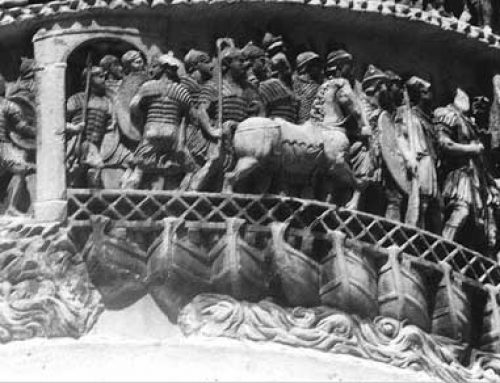
History of influenza: Influenza comes from chickens: this is a clay hen whistle from Mohenjo Daro (ca. 2700 BC, now in Brooklyn Museum)
What is influenza?
Influenza is a virus that mostly infects birds – like chickens – and pigs. But influenza can also attack people. Influenza history goes back a long, long time.
Where do chickens come from?
How about pigs?
History of medicine
Where did influenza come from?
Probably people started to get influenza around the time they started keeping chickens and living in cities – in China and India, about 3000 BC, in Greece about 500 BC, and in North America not until about 1500 AD. But the first good description of influenza comes from Hippocrates, in Greece, who described an influenza epidemic that happened in 412 BC.
Who was Hippocrates?

Rooster (Corinthian plate, ca. 550 BC)
What are the symptoms of influenza?
About a third of the people who get influenza (flu for short) don’t have symptoms, but the rest of the people feel achy and cold and tired and have high fevers. They often have coughs and runny noses and headaches. Most people who get flu get better without any medicine after resting for a few days. But weaker and older people, and babies, may get pneumonia, and then they may die. Some kinds of flu kill mostly young, strong people instead. These kinds of flu cause your own immune system to over-react, and so people with strong immune systems are the most likely to die.
Life expectancy in the ancient world
Epidemics of influenza in history
Sometimes there were epidemics of influenza, where thousands or even millions of people caught influenza all at once, and many of them died. In addition to the Greek epidemic of 412 BC, there seem to have been several in the Middle Ages. The more people travelled around the world, the bigger flu epidemics got. There was one in 1580 that started in Russia and spread to Africa and then to Europe. Russian expansion across Asia under Catherine the Great brought flu epidemics in 1781 and 1830.
More about Catherine the Great

People sick with influenza in bed in a US Navy training station in California (1918)
World War I and influenza
The biggest influenza epidemic ever was near the end of World War I, in 1918. Young soldiers began dying of influenza – the kind that kills strong people. When the soldiers sailed back home after the war, they brought the flu with them. Before the epidemic ended, nearly a quarter of all the people in the world caught influenza, and 100 million people died of it: about 5% of all the people in the world, and many more than were killed in the war itself.
More about World War I
We still have no good vaccination and no cure for influenza, and we still live with lots and lots of chickens, so another big influenza epidemic will probably happen sooner or later.




